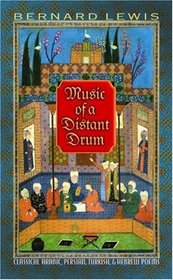Search -
Music of a Distant Drum: Classical Arabic, Persian, Turkish, and Hebrew Poems.
Music of a Distant Drum Classical Arabic Persian Turkish and Hebrew Poems
Music of a Distant Drum marks a literary milestone. For the first time in English, poems from four leading literary traditions of the Middle East representing a wide sweep of medieval history appear in a single volume compiled by a single translator. Bernard Lewis, one of the world's greatest authorities on the region's culture and histor... more »
Music of a Distant Drum marks a literary milestone. For the first time in English, poems from four leading literary traditions of the Middle East representing a wide sweep of medieval history appear in a single volume compiled by a single translator. Bernard Lewis, one of the world's greatest authorities on the region's culture and histor... more »
ISBN-13: 9780691089287
ISBN-10: 0691089280
Publication Date: 10/1/2001
Pages: 224
Rating: ?
ISBN-10: 0691089280
Publication Date: 10/1/2001
Pages: 224
Rating: ?
0 stars, based on 0 rating
Publisher: Princeton University Press
Book Type: Hardcover
Members Wishing: 0
Reviews: Amazon | Write a Review
Book Type: Hardcover
Members Wishing: 0
Reviews: Amazon | Write a Review
Genres:
- Literature & Fiction >> Poetry >> Anthologies
- Literature & Fiction >> Poetry >> General
- Literature & Fiction >> World Literature >> United States >> Asian American & Pacific Islander >> General
- Literature & Fiction >> Poetry >> Regional & Cultural >> United States >> Asian American




